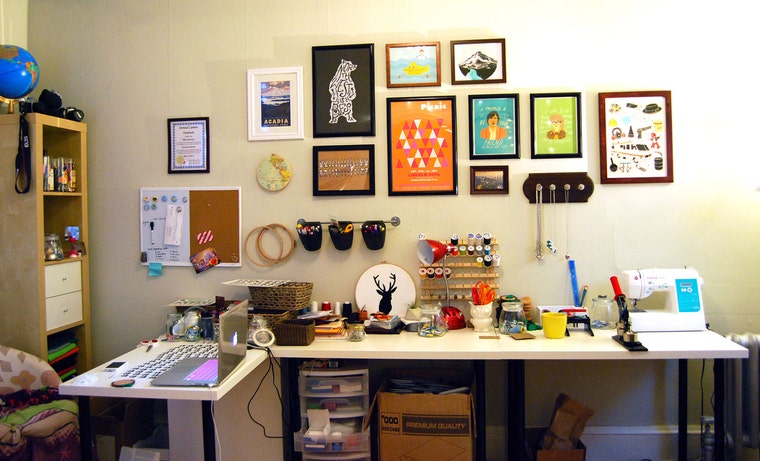
Etsy is growing every day in popularity and notoriety. It’s THE go to place to find hand-crafted and indie-designed goods online. For creative, crafty people out there, the idea of opening an Etsy shop can be quite alluring. On top of the extra income, it’s pretty flattering to think people would actually pay money for the things you make.
If you’re thinking of taking the plunge and seriously considering opening your own craft business, here are some things to consider:
1. What will you sell?
This one might be a no-brainer for you. You may already have a very clear vision of what your entire product line will look like. Awesome! You can skip ahead to number 2.
You might, however, not have a laser focus just yet. Often, people who are crafty, artistic and creative have more than one craft interest and skill. You might be a knitter who also likes to sew. You might be a screen printer who also makes pottery. If you fall into this category, you might have to make some tough choices about the products you will sell.
Now this is totally just a guideline and not a hard and fast rule but it’s often a good idea to not have too much variety. Customers tend to be drawn to shops that focus on quality and quantity within one area. For example, a shop with knitted hats, knitted scarves and knitted headbands will give off a more cohesive brand than a shop with knitted hats, ceramic vases, and vintage men’s watches.
2. What is your market space like?
Alright, time to roll up your sleeves and do some market research. Is there a lot of competition in your category and can you easily be the new shining star? The good news is that Etsy makes a lot of data publicly available, you just have to spend a little time looking around. Do some Etsy searches of the kinds of items you want to sell and pay attention to the following:
- How many similar items are there?
- How many similar sellers are there?
- What’s the average price of similar items?
- How many sales have the similar sellers made (bottom right sidebar of the shop)? Don’t forget to factor in how long the shop has been open.
- How does the quality of your items compare to the high end/low end of similar items?
- Do your items offer anything particularly unique from what’s out there?

3. How patient are you?
It can take some time to gain traction on Etsy. The number of sales you get is a function of the number of views you get. The number of views you get is dependent on your rankings in Etsy’s search results. There are several factors which affect your ranking in Etsy’s search algorithm which do not favor new stores:
- The more items in your shop the better. Unless you already have a fully-developed product line, it may take some time to flesh out your store’s offerings.
- The more sales the better. It’s the same paradox as social media where tweets, pins and posts that already have hundreds of likes can easily go on to get thousands of likes while the rest fade into oblivion. Ok, maybe it’s not that bleak, but it’s definitely an uphill battle.
- The more reviews the better. And you obviously can’t have any reviews if you don’t even have any sales yet.
Most stores are open for a couple weeks before getting their first sale and it’s not unheard of to go months without getting that first sale.
Last March I had my first sale and it wasn’t until 7 months later in October that I had a month with an average of one sale a day.
4. What does success means to you?
Starting any business is hard work. In order for you to keep perspective, budget your time and energy, and stay positive it’s crucial to define what “being successful” looks like to you.
Are you looking to create a side business that will generate an extra $1000/month income? Do you want to eventually quit your day job and do Etsy full-time? Are you a hobbyist who just wants to sell the extra projects you have lying around the house?
If you eventually want to quit your day job to run your Etsy, the amount of work and the level of seriousness you’ll need will be quite different from those of a hobbyist.
Whether it’s a general vision board type thing or a set of hard numbers you’d like to achieve each month, take a moment to reflect on your goals before jumping in.

5. How much time are you willing to put in?
If you only put in time when you feel like it, you’ll likely never get off the ground. On the other side, if you spend every waking second obsessing over every detail, you’ll likely get burnt out.
In the beginning, the key is really consistency. Release new items on a regular basis. Develop a steady social media plan for promotion. Get a routine going and from there you can assess how to adjust to reach your goals.
By now, you should have some idea of whether or not Etsy is a good fit for you. If you just want to get rid of those 3 tea cozies you crocheted last year that are sitting in the back of your closet, the time and effort it would take to get noticed in Etsy’s search probably won’t be worth the trouble. Etsy is a business not a hobby.
If you really want to make a successful Etsy store you can do so even in a crowded marketplace. Just remember that opening an Etsy store is more than creating a cute, crafty product. You will need to do research and market the hell out of yourself just like any other small business owner would.